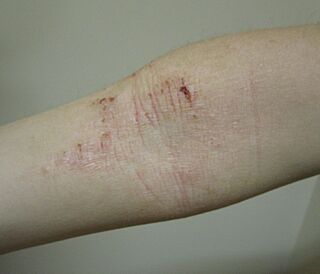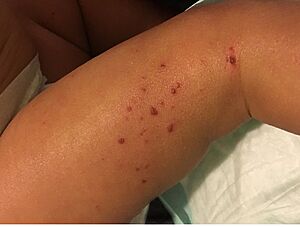Atopic dermatitis facts for kids
Quick facts for kids Atopic dermatitis |
|
|---|---|

Atopic dermatitis on the inside of an elbow.
|
|
| Classification and external resources | |
| Synonyms | Atopic eczema, allergic eczema |
| Specialty | Dermatology, Allergy |
| Patient UK | Atopic dermatitis |
Atopic dermatitis, often called eczema, is a common skin condition that makes the skin feel itchy and look red, swollen, and cracked. It is a long-lasting condition, but it can get better or worse over time.
Eczema is not contagious, which means you can't catch it from someone else. It affects about 20% of people, or 1 in 5, at some point in their lives. It is most common in babies and young children, but people of any age can have it. Many people who have eczema as a child find that it gets much better as they grow up.
The condition often starts in childhood. In babies, it might appear on the face, arms, and legs. As kids get older, eczema is most common in the creases of the elbows and behind the knees. Scratching the itchy areas can make the skin feel worse and can sometimes lead to skin infections. People with atopic dermatitis are also more likely to have hay fever or asthma.
Contents
What Does Eczema Look and Feel Like?
The main symptom of eczema is itching, which can be very strong. The skin can also feel sore or have a burning feeling.
People with eczema often have dry skin all over their body. The patches of eczema can look different depending on a person's skin tone.
- On lighter skin, eczema patches are usually red.
- On darker skin, they might look purple, dark brown, or greyish.
Other signs you might see on the skin include:
- Dry, scaly patches
- Swelling
- Cracks in the skin
- Small bumps
- Clear fluid oozing from the patches
- Thickened skin in areas that have been scratched a lot over time
When eczema heals, it can leave behind lighter or darker spots on the skin. These are not scars and will usually fade back to the normal skin color over a few months.
What Causes Eczema?
Doctors don't know the exact cause of atopic dermatitis. They believe it's caused by a combination of things, including genetics and the environment.
Genetics and the Skin Barrier
Many people with eczema have family members who also have eczema, asthma, or hay fever. This suggests that genes play a role.
These genes can affect the skin's "barrier." A healthy skin barrier helps keep moisture in and protects the body from germs and irritants. In people with eczema, this barrier is weaker. This allows moisture to escape, making the skin dry. It also lets irritants and allergens get into the skin more easily, which can cause the immune system to overreact and lead to redness and itching.
The Immune System
The immune system is the body's defense against germs. In people with atopic dermatitis, the immune system can be overactive. It sometimes reacts to harmless things, like dust or pollen, as if they were a threat. This overreaction causes inflammation, which is the redness, swelling, and itching seen in eczema.
Environmental Triggers
Certain things in the environment, called triggers, don't cause eczema but can make it flare up or get worse. Common triggers include:
- Dry air: Low humidity and cold weather can dry out the skin.
- Irritants: Soaps, detergents, and some fabrics like wool can irritate the skin.
- Allergens: Things like dust mites, pollen, and pet dander can trigger a flare-up in some people.
- Stress: Feeling stressed or worried can sometimes make eczema symptoms worse.
- Food: In a small number of people, certain foods might trigger eczema. This is more common in young children.
How Do Doctors Diagnose Eczema?
A doctor can usually diagnose atopic dermatitis just by looking at the skin and asking questions. There isn't a special test for it.
The doctor will want to know:
- If the skin is itchy.
- Where the rash appears on the body.
- If you or your family members have a history of eczema, asthma, or hay fever.
- When the symptoms started.
- If you have had dry skin for a long time.
The doctor will also make sure the rash isn't caused by another skin condition, like contact dermatitis or psoriasis.
How to Manage Eczema
There is no cure for atopic dermatitis, but there are many ways to control the symptoms and reduce how often it flares up.
Daily Skin Care
Good skin care every day is the most important part of managing eczema. This helps protect and strengthen the skin barrier.
- Moisturize: Apply a moisturising cream (also called an emollient) all over the body at least twice a day. This is especially important after bathing. Ointments and creams are usually better than lotions because they are thicker and contain more oil.
- Bathing: Take a short, lukewarm bath or shower once a day. Hot water can dry out the skin. Use a gentle, soap-free cleanser instead of regular soap. After bathing, gently pat the skin dry and apply moisturizer right away.
Medications for Flare-Ups
When eczema flares up and becomes very red and itchy, a doctor may prescribe a medicated cream.
- Topical Steroids: These are creams or ointments that contain corticosteroids. They are very effective at reducing inflammation and itching. It is important to use them exactly as the doctor says.
- Other Medicated Creams: There are other types of non-steroid creams that also help calm the immune system in the skin. A doctor might prescribe these if steroid creams are not enough.
For very severe eczema that doesn't get better with creams, a doctor might suggest other treatments, like special pills or injections.
Light Therapy
For some people, a treatment called light therapy (or phototherapy) can help. This involves exposing the skin to special ultraviolet (UV) light for a few minutes, several times a week. This must be done in a doctor's office or clinic.
Living with Eczema
Living with eczema can be challenging, but learning how to manage it can make a big difference.
- Know Your Triggers: Try to figure out what makes your eczema worse and avoid those things. This could be a certain soap, fabric, or even stress.
- Don't Scratch: Scratching makes the rash worse and can damage the skin. Keeping fingernails short can help. If you feel itchy at night, wearing cotton gloves to bed might help.
- Choose Soft Clothing: Wear clothes made of soft, breathable fabrics like cotton. Avoid scratchy materials like wool.
- Follow Your Doctor's Plan: It's important to use your moisturizers and medicines the way your doctor told you to. Creating a regular skin care routine can help you stay on track and keep your skin healthy.
 | Mary Eliza Mahoney |
 | Susie King Taylor |
 | Ida Gray |
 | Eliza Ann Grier |


